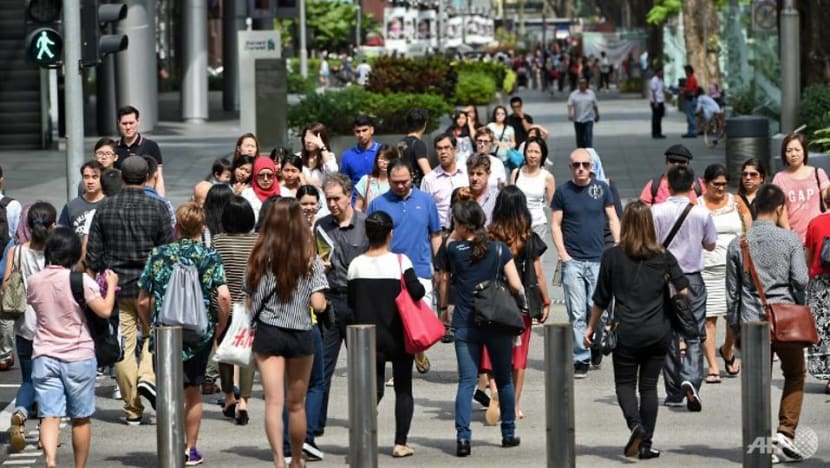Singapore's core inflation jumps to 1.2% in October, highest so far in 2025
The sharp rise in inflation was driven by higher prices in services, food and retail, as well as a smaller decline in electricity and gas prices.

Pedestrians cross a street at the Orchard Road shopping district in Singapore. (File photo: AFP/Roslan Rahman)

This audio is generated by an AI tool.
SINGAPORE: Singapore’s core inflation rose sharply to 1.2 per cent year-on-year in October, official data showed on Monday (Nov 24), up from 0.4 per cent in the month before.
The figure is the highest so far this year, driven by higher prices of health insurance, food and retail products, as well as a smaller decline in electricity and gas prices.
Core inflation had stayed below 1 per cent for several months. The last time it rose beyond that was in December 2024, when the figure came in at 1.7 per cent.
On a month-on-month basis, core prices grew by 0.5 per cent in October.
Overall inflation, as measured by the Consumer Price Index-All Items (CPI-All Items), picked up from 0.7 per cent in September to 1.2 per cent in October, due to a larger increase in private transport prices.
On a monthly basis, overall inflation - which excludes non-consumption expenditures such as purchases of houses, shares and other financial assets and income taxes - was unchanged in October.
SECTORS
Official data released on Monday showed that services inflation rose to 1.8 per cent in October from 0.3 per cent the month before.
This was due to a faster pace of increase in health insurance costs, as well as a rise in healthcare services costs and holiday expenses, said the Ministry of Trade and Industry (MTI) and the Monetary Authority of Singapore (MAS).
Electricity and gas inflation fell less steeply because of a smaller decline in electricity prices.
Food inflation increased marginally to 1.2 per cent in October on the back of a faster increase in non-cooked food prices.
Retail and other goods inflation ticked up from 0.3 per cent to 0.4 per cent on account of a rise in the prices of clothing and footwear and personal effects.
Private transport inflation came in at 3.8 per cent, up from from 3.7 per cent in September, due to a steeper increase in car prices, while accommodation inflation fell slightly from 0.4 per cent to 0.3 per cent due to a slower pace of increase in housing rents.
INFLATION "BOTTOMED" IN THIRD QUARTER
The unexpectedly larger jump in October shows that "inflation has likely bottomed", OCBC head of global markets research and strategy Selina Ling said.
"The recent inflation data underscores why MAS paused its easing monetary policy cycle in July and October 2025 and is likely to continue to be on hold for the upcoming January 2026 monetary policy statement," Ms Ling told CNA.
"The MAS statement still points to a decline in imported costs, albeit at a slower pace."
Ms Ling also noted that regional inflation is tipped to pick up modestly and that crude oil prices should see a more modest downside in 2026 as compared to 2025.
DBS senior economist Chua Han Teng noted that with both headline and core inflation below 2 per cent, they remain "contained and consistent with domestic price stability".
"Singapore’s inflation showed clearer indications that it bottomed in 3Q25, aligning with the MAS’ expectations," said Mr Chua.
"This trough in core inflation coincided with stronger-than-expected economic growth compared to advance estimates for the same quarter."
The economic conditions support MAS' decision to keep its monetary policy unchanged in October, Mr Chua said.
The central bank's current policy settings appear consistent with a narrower 0 per cent output gap and higher core inflation of 0.5 to 1.5 per cent in 2026.
"We expect the MAS to keep the powder dry in 2026, maintaining its three policy parameters, safeguarding flexibility in an uncertain global environment," he added.
OUTLOOK
Maintaining their outlook from last month, MAS and MTI said that Singapore’s imported costs should continue to decline, albeit at a slower pace in the months ahead.
They projected global crude oil prices to fall more gradually in 2026 compared to 2025, with regional inflation picking up modestly after the weak outturns this year.
"On the domestic front, administrative factors temporarily dampening inflation are expected to continue tapering over the coming quarters," said MAS and MTI.
"Unit labour cost growth should begin to increase as productivity growth normalises, while private consumption demand is likely to remain steady."
Reflecting these factors, MAS and MTI said core inflation is projected to come in at around 0.5 per cent in 2025 before rising to 0.5 to 1.5 per cent in 2026.
CPI-All Items inflation is also expected to average 0.5 to 1 per cent in 2025 and 0.5 to 1.5 per cent in 2026.
MAS and MTI warned that the inflation outlook is subject to uncertainties, as supply shocks - including those stemming from geopolitical developments - could lift some imported costs abruptly.
“However, a sharper-than-expected weakening in global demand could keep core inflation lower for longer,” they said.
“Another significant decline in global oil prices could also temporarily tamp down the pace of price increases.”

















